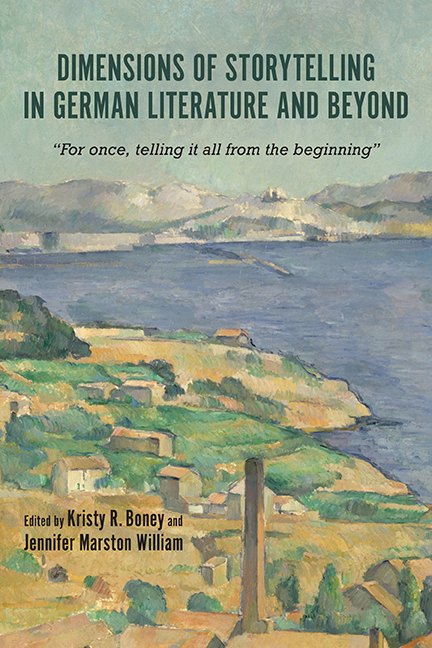 Dimensions of Storytelling in German Literature and Beyond
Dimensions of Storytelling in German Literature and Beyond Book contents
- Frontmatter
- Contents
- Acknowledgments
- Introduction: The Social, Political, and Personal Dimensions of Storytelling
- Part I Anna Seghers: A Missing Piece in the Canon of Modernist Storytellers
- Part II Expressions of Modernity: Using Storytelling Unconventionally
- 8 Storytelling and Telling Stories in Heine's Prose Fiction
- 9 Modernist Haze: Topographical Textures in Paul Klee and Franz Kafka
- 10 Synthesis and Transtextuality: The Jewish Reinvention of Chinese Mythical Stories in “Shanghai Ghetto”
- 11 American Children Writing Yiddish: The Published Anthologies of the Chicago Sholem Aleichem Schools
- 12 A Literary Depiction of the Homeland of Jews in Czechoslovakia and East Germany after 1945
- 13 Changed for the Better? Alternative Uses of the Transformative Cancer Trope in Thomas Mann's Die Betrogene and Nadine Gordimer's Get a Life
- Part III The Personal Narrative: Storytelling in Acute Historical Moments
- Notes on the Contributors
- Index
11 - American Children Writing Yiddish: The Published Anthologies of the Chicago Sholem Aleichem Schools
from Part II - Expressions of Modernity: Using Storytelling Unconventionally
Published online by Cambridge University Press: 12 April 2019
- Frontmatter
- Contents
- Acknowledgments
- Introduction: The Social, Political, and Personal Dimensions of Storytelling
- Part I Anna Seghers: A Missing Piece in the Canon of Modernist Storytellers
- Part II Expressions of Modernity: Using Storytelling Unconventionally
- 8 Storytelling and Telling Stories in Heine's Prose Fiction
- 9 Modernist Haze: Topographical Textures in Paul Klee and Franz Kafka
- 10 Synthesis and Transtextuality: The Jewish Reinvention of Chinese Mythical Stories in “Shanghai Ghetto”
- 11 American Children Writing Yiddish: The Published Anthologies of the Chicago Sholem Aleichem Schools
- 12 A Literary Depiction of the Homeland of Jews in Czechoslovakia and East Germany after 1945
- 13 Changed for the Better? Alternative Uses of the Transformative Cancer Trope in Thomas Mann's Die Betrogene and Nadine Gordimer's Get a Life
- Part III The Personal Narrative: Storytelling in Acute Historical Moments
- Notes on the Contributors
- Index
Summary
BETWEEN 1912 and 1977 Chicago was home to six Yiddish secular school organizations: the National-Radical schools (1912–18), the Poalei Zionist and Jewish National Workers’ Alliance (Farband) schools (1913–60), the Workmen's Circle schools (1919–65), the Nonpartisan Labor Children's Schools, later called the Children's Schools of the International Workers’ Organization (1929–70), the Borokhow School (founded in 1920), and the Sholem Aleichem schools (1925–77). In theory, they had much in common. Their leaders were members of “progressive,” left-oriented political movements who sought to counterbalance the “capitalist” ideology transmitted by American public schools; and they believed that maintaining the Yiddish language and culture (as opposed to the Hebrew language or religion) both in the Diaspora and Eretz Israel was the key to uniting the Jewish people worldwide.
The Sholem Aleichem (ShA) Schools were the last Chicago secular Yiddish schools to close their doors, offering classes until at least 1977. Unlike the other secular Yiddish schools in Chicago, which were affiliated with political organizations, the ShA Folk Schools were by principle nonpartisan, as outlined in their 1927 mission statement:
The Sholem Aleichem School is a nonpartisan educational institution which aims to spread the thought of a modern, progressive secular and national education in Yiddish; to teach the Yiddish language, Jewish history, Jewish literature, the Bible, Jewish songs, folklore; and to acquaint the Jewish child with the Jewish holidays and Jewish traditions. The Yiddish schools are an end to themselves and are not built to serve any political party or group…. The cultural needs of the Jewish community demand that cultural and educational work be truly nonpartisan (not anti-partisan)…. The Sholem Aleichem school group is outspokenly Yiddishist because the Yiddish language binds together the dispersed communities of the Jewish people and gives them a unifying element as a national-cultural unit. The Yiddish language is also an important instrument for continued nationalcultural creativity.
With a deliberate focus on the fine arts and commitment to involving students in “living” Yiddish culture, the schools produced a Yiddish radio show and taught folk music, recitation, acting, and dance. From the mid- 1930s the school group also operated the Children's Art Studio, led by prominent figures in the Chicago Jewish arts community, such as Todros Geller.
- Type
- Chapter
- Information
- Dimensions of Storytelling in German Literature and Beyond“For once, telling it all from the beginning”, pp. 152 - 163Publisher: Boydell & BrewerPrint publication year: 2018


